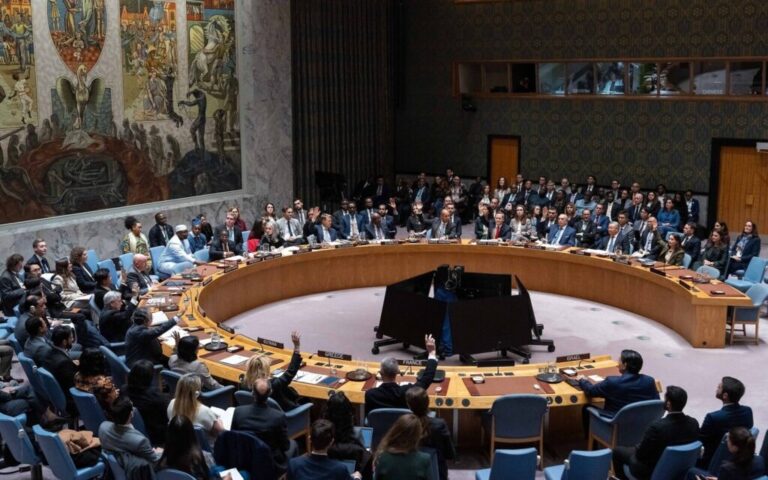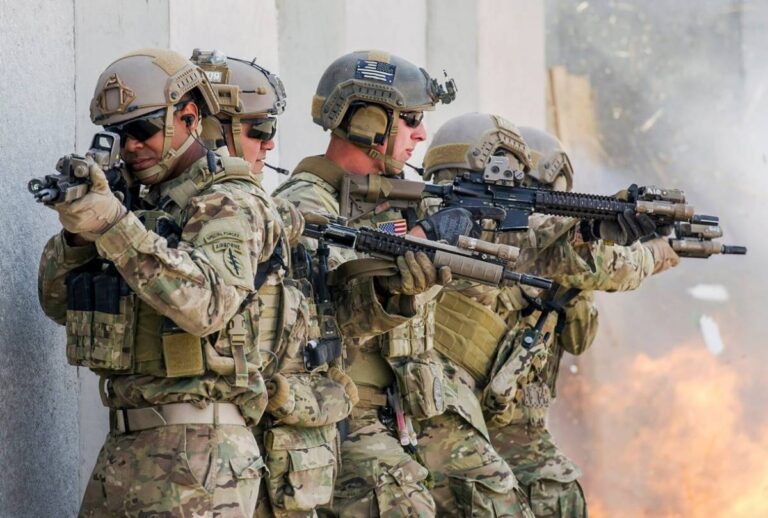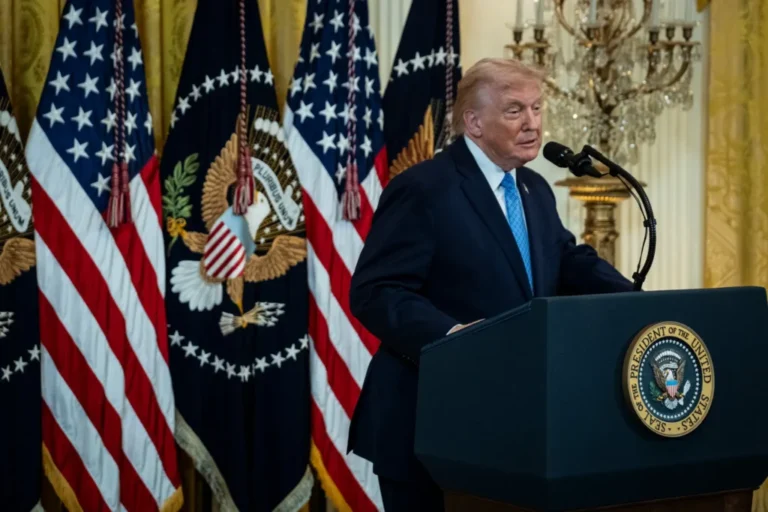INTERNATIONAL POLITICS
UN Security Council approves Trump’s Gaza plan
Islamic Resistance Movement (Hamas) issued a statement rejecting the resolution and reaffirming the right to self-defense

On Monday (17), the United Nations Security Council approved a resolution sponsored by the United States that establishes the creation of an International Stabilization Force (ISF) to operate in the Gaza Strip. The vote ended with 13 votes in favour and two abstentions, from Russia and China, and authorizes the immediate deployment of foreign contingents in the Palestinian territory.
Mandate of the international force and scope of operations
The approved text stipulates that the mission will have an initial duration of two years, extendable according to the Council’s own assessment. The force will have a broad mandate: border surveillance, protection of civilians, supervision of aid corridors, administrative reorganization and training of a new Palestinian police force subject to a screening process conducted by the countries involved.
The resolution also authorizes the use of “all necessary measures” to implement its objectives. These include the possibility of disarmament actions, the seizure of “unauthorized weapons” and direct intervention in existing security structures inside Gaza.
The document adds that foreign troops will be able to coordinate with international financial institutions. The World Bank will oversee reconstruction projects and administer a specific trust fund for the Palestinian territory.
Creation of an administrative body under foreign supervision
In addition to the military presence, the approved plan includes the installation of a transitional administrative body called the Peace Council. This council will work alongside the international force and will have political-administrative powers in Gaza, forming the backbone of the US plan to reorganize the territory after the two-year genocide.
According to the text, this body will work to formulate “stability” policies, manage essential services and oversee reconstituted security structures under external supervision. The resolution does not specify the members of the council or the selection criteria.
US plan faces resistance in Gaza
The approval of the resolution comes at a time when it is facing resistance. According to the Wall Street Journal, the US government is finding it difficult to implement its project for Gaza due to the strengthening of popular support for the Palestinian Resistance. The imperialist newspaper describes that, after the most recent truce and the withdrawal of occupation troops from various areas, fighters from the Islamic Resistance Movement (Hamas) have resumed internal security duties.
According to the outlet, the presence of the fighters on the streets has re-established basic protection services, contained mercenary groups funded by the Zionist occupation and reversed the scene of disorder caused by deliberate attacks on Palestinian public servants. Residents quoted say that the resumption of police activity by the Resistance has prevented a further deterioration in security conditions.
Hazem Sarour, a 22-year-old shopkeeper, told the newspaper: “We saw a collapse, thieves, armed gangs and disorder. No one has been able to contain it apart from Hamas. That’s why people support them.”
Trump celebrates result and announces leadership of the body
Shortly after the vote, US President Donald Trump released a message celebrating the approval of the plan and confirming that he will chair the Peace Council. In his publication, he said: “Congratulations to the world on the incredible vote by the Security Council, recognizing and endorsing the BOARD OF PEACE, which will be chaired by me, and will include powerful and respected leaders from around the world.”
Trump thanked the 15 members of the Security Council by name and also mentioned countries that, according to him, supported the project during the negotiations, such as Qatar, Egypt, the United Arab Emirates, Saudi Arabia, Indonesia, Turkey and Jordan. The US president said that the official composition and first steps of the new body would be announced in the coming weeks.
Russia and China criticize mandate of force
During the session, the Russian Federation declared that it could not support the text presented by the United States. According to its representative, the resolution does not preserve the principle of “two states, two peoples” and grants the International Stabilization Force powers of armed imposition that could turn the foreign contingent into part of the conflict.
The diplomat also said that none of the countries consulted about joining the mission would have agreed to such a mandate. The Russian delegation warned that the text could serve as a cover for US and Israeli “experiments” in the occupied Palestinian territory, recalling previous initiatives led by Washington that ended up producing results opposite to those declared.
The Chinese delegation, for its part, said that the Council should prioritize a lasting ceasefire, address the humanitarian situation in Gaza and move forward with reconstruction. The Chinese representative expressed “deep concern” at the lack of clarity about the structure and mandate of both the Peace Council and the international force provided for in the plan.
According to the delegation, the text gives little visibility to Palestine, does not state Palestinian sovereignty explicitly enough and leaves the reference to the two-state solution undefined. China also criticized the hasty and non-consultative nature of the negotiations and the limited role of the UN itself. Because of these factors, together with the positions expressed by countries in the region, the Chinese delegation justified its abstention.
Hamas rejects resolution and denounces foreign tutelage
Following the decision, Hamas issued a statement rejecting the plan in its entirety. The Palestinian party claims that the resolution “does not meet the political and humanitarian demands of the Palestinian people” and seeks to impose “a mechanism to achieve the objectives of the occupation, which has failed to achieve them through its war of extermination over the past two years”.
The group claims that the text places Gaza under international tutelage and attempts to separate the territory from the rest of occupied Palestine. According to the statement, the resolution violates national rights and seeks to “impose a new reality” dissociated from Palestinian self-determination.
The revolutionary organization reaffirmed that any discussions about arming the Resistance are an internal matter and can only take place in a political process that guarantees a complete end to the occupation and the creation of a Palestinian state with Al-Quds (occupied Jerusalem) as its capital.
For Hamas, international forces could only act to monitor ceasefires and exclusively in border areas, under full UN supervision and without any coordination with the occupation.
Regarding the entry of aid and the opening of crossings, the organization said that these measures are basic rights of the population and cannot be turned into a bargaining chip by foreign military structures.
Read the full Hamas statement here:
Press ReleaseIn response to the adoption by the UN Security Council of the US draft resolution on Gaza, the Islamic Resistance Movement (Hamas) affirms the following:
This resolution does not rise to the level of the political and humanitarian demands and rights of our Palestinian people, particularly in the Gaza Strip, which for two years has endured a brutal genocidal war and unprecedented crimes committed by the terrorist occupation in front of the entire world – the effects and repercussions of which remain ongoing, despite the declaration of the end of the war according to President Trump’s plan.
The resolution imposes an international guardianship mechanism on the Gaza Strip, which our people and their factions reject. It also imposes a mechanism to achieve the objectives of the occupation, which it failed to accomplish through its brutal genocide. Furthermore, this resolution disconnects the Gaza Strip from the rest of the Palestinian geography and attempts to impose new realities far removed from the legitimate national principles and rights of our people, thus depriving our people of their right to self-determination and the establishment of their Palestinian state with Jerusalem as its capital.
Resisting the occupation by all means is a legitimate right guaranteed by international laws and conventions. The weapons of resistance are linked to the existence of the occupation, and any discussion on the issue of weapons must remain an internal national matter, connected to a political path that ensures the end of the occupation, the establishment of the state [of Palestine] and self-determination.
Assigning the international force tasks and roles inside the Gaza Strip, including disarming the resistance, removes its neutrality and turns it into part of the conflict in favor of the occupation. Any international force, if established, should be deployed only on the borders to separate forces, monitor the ceasefire, and should be fully under UN supervision. It should operate exclusively in coordination with official Palestinian institutions, without the occupation having any role in it, and work to ensure the flow of aid, without being transformed into a security authority that persecutes our people and their resistance.
Humanitarian aid, relief for those affected and the opening of crossings are fundamental rights of our people in the Gaza Strip. Aid and relief operations cannot remain subject to politicization, blackmail and subjugation to complex mechanisms in the midst of the unprecedented humanitarian catastrophe created by the occupation, which requires expediting the opening of the crossings and mobilizing all resources to confront it through the UN and its agencies, especially UNRWA.
We call on the international community and the Security Council to uphold international law and humanitarian values, and to adopt resolutions that achieve justice for Gaza and the Palestinian cause, through the effective cessation of the brutal genocidal war in Gaza, reconstruction, an end to the occupation and the empowerment of our people for self-determination and the establishment of their independent state with Jerusalem as its capital.



